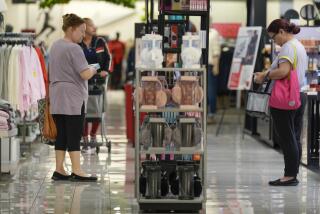Americans in Buying Mood in August : New Cars Top List as Spending Rises 1.2%; Savings Level Drops
- Share via
WASHINGTON — Americans went on a buying spree last month, boosting personal spending by the largest amount since April. But they financed the purchases by pushing their savings level down to a record low, the government said Thursday.
The Commerce Department said personal consumption spending soared 1.2% last month as Americans rushed to take advantage of cut-rate financing incentives being offered by auto makers before the start of the new model year.
The August spending gain was three times higher than the 0.4% advance in July and was the biggest increase since a 1.3% rise in April.
But Americans’ income gains lagged far behind the rise in spending. Personal incomes rose a modest 0.3% in August, the weakest showing since a May decline.
Lowest Since 1959
The discrepancy between spending and income growth was made up by dipping into savings and going deeper into debt. Americans’ personal savings rate fell to 2.8% in August, the lowest it has been since the government began keeping monthly savings statistics in 1959.
In addition, other statistics show that Americans are now carrying a record level of consumer debt. The combination of sluggish income gains, low savings and high debt levels will likely doom hopes of much increase in consumer spending in coming months, economists said.
This would be bad news for the Reagan Administration, which is counting on good gains in consumer spending to propel the economy out of the doldrums that it has been in for the past year. The Administration is predicting a rebound in economic activity to a rate near 5% in the second half of the year, far above the 1.1% rate from January through June.
But private economists say the economy is unlikely to grow above a 3% rate in the second half of the year.
“When the Administration says the economy is packing new power, it is just not true,” said Robert Gough, senior vice president at Data Resources, a private economic forecasting firm. “I think the economy is going through a last gasp before it takes a breather.”
Gough said he was not forecasting a recession, but he said economic growth will not show any real strength until the last half of 1986.
The government is due to report its initial “flash” estimate for overall growth in the gross national product today. Gough predicted an annual growth rate of 3.5% to 4% in the current quarter, but he said this would slip to 2% in the final three months of the year.
Paul Getman, an economist with Chase Econometrics, predicted an even lower 2.5% growth rate for the third quarter.
“We are in the same holding pattern we have been in since the beginning of the year--extremely sluggish growth and no direction to the economy,” he said.
The Commerce Department said auto sales provided the biggest part of the increase in consumer spending in August. Total spending increased at an annual rate of $31.1 billion last month and $21.9-billion of that gain was in durable goods such as autos.
However, Allen Sinai, chief economist for Shearson Lehman Bros., said the big surge in auto sales would mean weaker sales of 1986 cars and thus lower economic growth in the future.
“The pace of spending so far outstripped the gain in incomes that, beyond the end of the special financing arrangements on autos in September, it is hard to see how the consumer can keep it up,” he said.
The 0.3% income gain followed a 0.4% advance in July. While personal incomes rose 9.8% last year, they have advanced by just 4.1% at an annual rate for the first six months of this year, as income growth has weakened with the overall slump in economic activity.
A big part of the August income advance came from a $3.6-billion annual rise in manufacturing payrolls, the first sign of strength in this sector in some time.
But farmers, another beleaguered part of the economy, continued to suffer. Farm proprietors’ incomes declined $1.2 billion in August, the second consecutive monthly drop.
Disposable, or after-tax, income rose 0.2% in August, down from a 0.5% increase in July.
More to Read
Inside the business of entertainment
The Wide Shot brings you news, analysis and insights on everything from streaming wars to production — and what it all means for the future.
You may occasionally receive promotional content from the Los Angeles Times.










